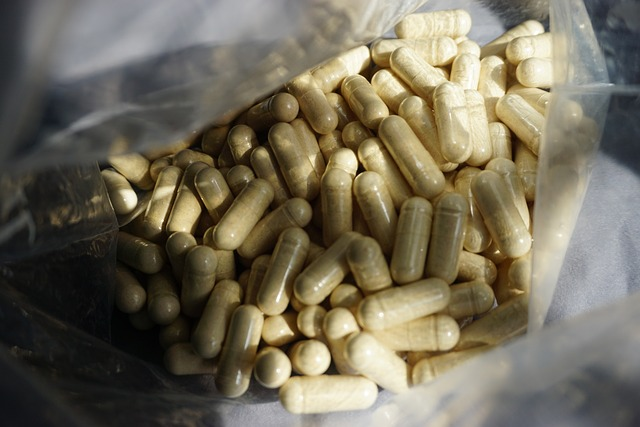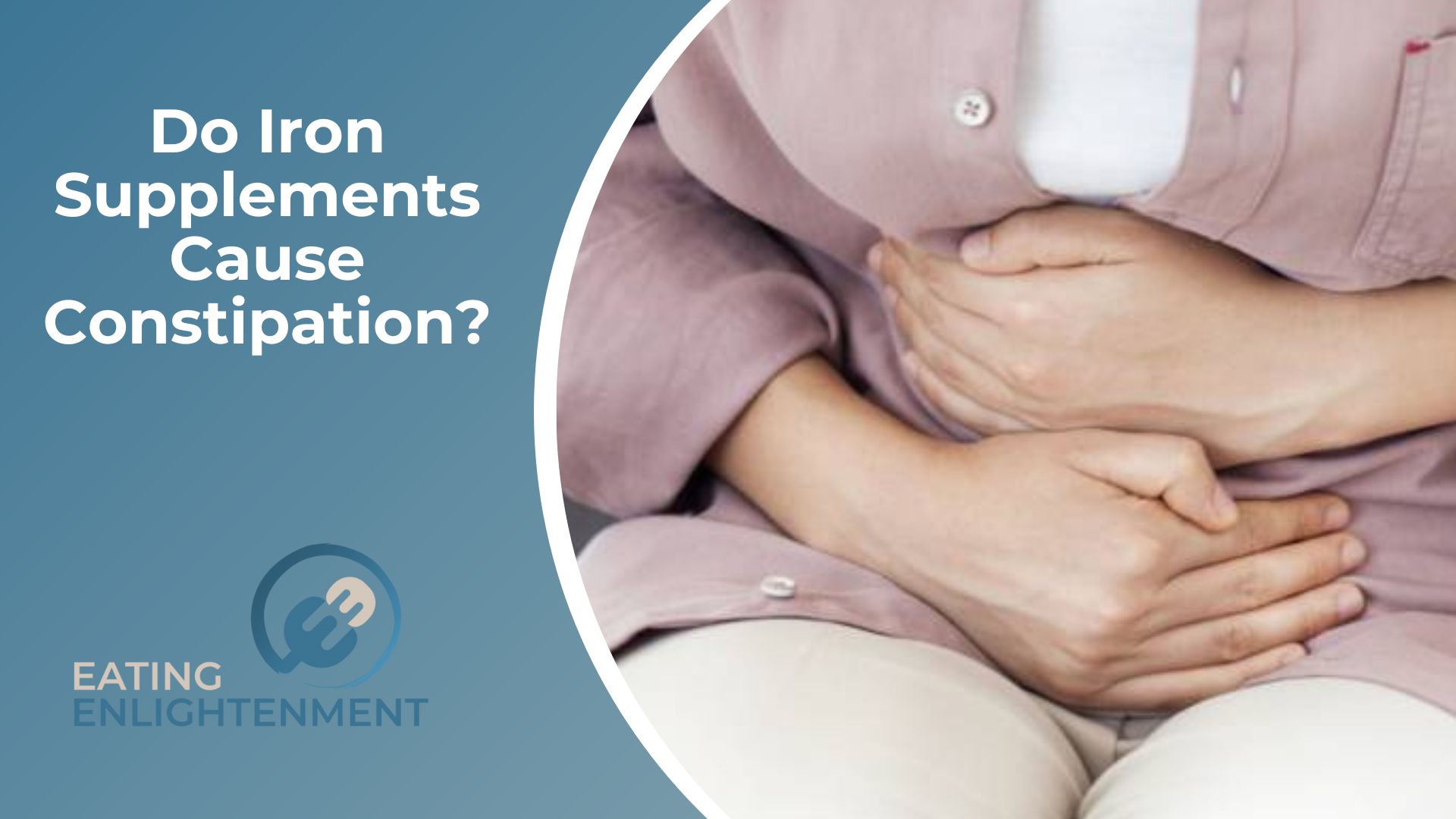Iron is an important mineral found in the human body. It is responsible for transporting oxygen throughout the body and helps to produce red blood cells.
While most people get enough iron from their diet, some people may need to take an iron supplement.
Iron supplements can be helpful for those who are deficient in iron, pregnant women, vegetarians, and people with chronic diseases such as cancer or AIDS. However, like all supplements, there are some risks associated with taking too much iron.
In this blog post we will discuss the risks of taking too much iron and whether or not it can cause constipation.
Iron in Supplements

The form of iron in supplements is important to consider when determining if they can cause constipation such as iron tablets. The two most common forms of iron in supplements are ferrous sulfate and ferric oxide.
Ferrous sulfate is the most popular form of iron supplement and is easily absorbed by the body. However, it can cause gastrointestinal side effects such as constipation, diarrhea, nausea, and vomiting.
Ferric oxide is another form of iron that is not as easily absorbed by the body. This means that it is less likely to cause gastrointestinal side effects but it may not be as effective in treating an iron deficiency.
Is iron in your multivitamin causing constipation?
Iron is a common ingredient in multivitamins. It is generally safe and effective, but can cause gastrointestinal side effects such as constipation, diarrhea, nausea, and vomiting.
If you experience any of these side effects after taking a multivitamin with iron, it is always important to talk to your doctor. They may be able to recommend a different brand or formula that does not contain iron.
Iron supplements can also interact with other medications, so it is important to talk to your doctor or pharmacist before starting an iron supplement.
If you are experiencing constipation or other gastrointestinal side effects after taking a multivitamin with iron, there are a few things you can do.
First, try taking your supplement with food. This can help to decrease the side effects.
Second, try a different brand or formula of multivitamin. Some brands or formulas do not contain iron.
Third, talk to your doctor about lowering your dosage.
They may be able to recommend a different brand or formula that does not contain iron. Iron supplements can also interact with other medications, so it is important to talk to your doctor or pharmacist before starting an iron supplement.
Signs iron pills are working
Iron pills are typically prescribed to treat iron deficiency anemia.
When taken as directed, they can be very effective at raising low iron levels and restoring normal hemoglobin production. However, it can take several weeks or even months of treatment before you start to see improvements.
Some people may experience side effects such as constipation, nausea, and stomach cramps during this time. These are usually mild and temporary.
If you are taking iron pills and not seeing any improvements after a few weeks, be sure to follow up with your doctor. They may need to adjust your dosage or prescribe a different type of iron supplement.
You may want to order an online blood test for iron deficiency so you can definitively track your progress.
Why you might need an iron supplement?

There are a few different reasons why you might need to take an iron supplement.
If you are pregnant, your body needs more iron to support the developing baby. Pregnant women should talk to their doctor about whether or not they need an iron supplement.
Vegetarians and vegans may also need to take an iron supplement because they are not getting enough iron from their diet. Meat is a good source of heme iron, which is more easily absorbed by the body than non-heme iron found in plants.
People with chronic diseases such as cancer or AIDS may also need to take an iron supplement. This is because these diseases can cause anemia, which is a condition in which there are not enough healthy red blood cells in the body.
Iron supplements can also be helpful for people who have undergone surgery or have suffered from an injury. This is because these events can lead to blood loss, which can cause anemia.
The link between iron, constipation and other stomach issues
There are a few different ways that iron can cause constipation or other stomach issues.
First, iron supplements can irritate the lining of the digestive system. This can lead to nausea, vomiting, diarrhea, or constipation.
Second, iron supplements can bind to other minerals in the digestive system. This can make it difficult for the body to absorb these minerals and can cause gastrointestinal side effects.
Third, iron supplements can increase the amount of acid in the stomach. This can lead to heartburn, indigestion, and nausea.
If you experience any of these side effects after taking an iron supplement, it is important to talk to your doctor. They may be able to recommend a different form of iron or a lower dosage.
Fourth, try not take an iron supplement on an empty stomach. This can increase the risk of gastrointestinal side effects. Instead, take your supplement with a meal or snack.
When not to take iron supplements
Iron supplements can be helpful for people who are deficient in iron. However, there are a few different groups of people who should not take iron supplements.
First, people with hemochromatosis should not take iron supplements. This is because they already have too much iron in their body and taking an supplement could make their condition worse.
Second, people with kidney disease should not take iron supplements. This is because their kidneys are not able to remove excess iron from the body and it can build up to dangerous levels.
Third, people with heart failure should not take iron supplements. This is because excess iron can cause heart problems.
Fourth, people with stomach ulcers should not take iron supplements. This is because iron can increase the amount of acid in the stomach and make ulcers worse.
If you are not sure if you should take an iron supplement, talk to your doctor. They will be able to recommend the best course of action for you.
Does liquid iron cause constipation?
Liquid iron is a common supplement that is taken to prevent or treat iron deficiency. While iron is essential for many body processes, including the transport of oxygen in the blood, too much iron can lead to side effects. One of the most common side effects of iron supplementation is constipation.
This is because iron can cause the stool to harden and become difficult to pass. If you are taking iron supplements and are experiencing constipation, there are a few things you can do to ease your symptoms.
First, make sure you are drinking plenty of fluids. This will help to keep your stool soft. Second, try taking a stool softener or laxative.
These medications can help to make it easier to pass stool. Finally, if your constipation persists, talk to your doctor about other treatment options.
Case presentation

A healthy 35-year-old woman presents to her primary care physician complaining of fatigue and malaise for the past several months. She reports that her energy levels are decreased and she feels tired all the time, even after a full night’s sleep.
This patient has also been experiencing constipation and some abdominal pain. She is generally healthy and has no chronic medical conditions. Her family history is significant for iron deficiency anemia.
The patient’s physical exam is normal except for mild pallor. Laboratory testing reveals a hemoglobin level of 10 g/dL (normal 12-16 g/dL) and a ferritin level of 15 ng/mL (normal 20-80 ng/mL). The patient is diagnosed with iron deficiency anemia and is started on oral iron supplements.
The patient returns to her primary care physician after one month of taking iron supplements. She reports that her energy levels have improved and she is no longer experiencing constipation or abdominal pain.
Her hemoglobin level has increased to 11 g/dL and her ferritin level has increased to 25 ng/mL. The patient is doing well on her iron supplementation and is advised to continue for another month.
Iron supplements are a common treatment for iron deficiency anemia. They are generally safe and effective, but can cause gastrointestinal side effects such as constipation, diarrhea, nausea, and vomiting.
If you experience any of these side effects after taking an iron supplement, it is important to talk to your doctor. They may be able to recommend a different form of iron or a lower dosage. But overall, iron supplements can be an important part of your health journey.
What to do if iron supplementation if causing constipation or gastro distress?
If you are experiencing constipation or other gastrointestinal side effects after taking an iron supplement, there are a few things you can do.
First, try taking your supplement with food. This can help to decrease the side effects.
Second, try a different form of iron. Some forms of iron are more easily absorbed by the body and may be less likely to cause side effects.
Third, talk to your doctor about lowering your dosage.
There are a few things you can do to combat constipation while on an iron supplement. First, make sure you are drinking enough fluids. This will help to keep your stool soft and easy to pass.
Second, eat foods that are high in fiber. This will help to add bulk to your stool and make it easier to pass.
Third, try a stool softener. This can help to make your stool softer and easier to pass.
If you are experiencing gastrointestinal side effects after taking an iron supplement, talk to your doctor as discussed above.
They may be able to recommend a different form of iron or a lower dosage.
Iron supplements can also interact with other medications, so it is important to talk to your doctor or pharmacist before starting an iron supplement.
Can you boost your iron levels and have a healthy gut?
Iron is a essential nutrient that plays a vital role in many bodily functions. It is important for carrying oxygen in the blood, supporting a healthy immune system, and keeping energy levels up.
Iron can be found in food sources such as red meat, poultry, beans, nuts, and leafy green vegetables. It is also available in supplement form.
While iron is necessary for good health, too much iron can actually be harmful. Iron supplements can cause gastrointestinal side effects such as constipation, diarrhea, nausea, and vomiting.
If you experience any of these side effects after taking an iron supplement, it is important to talk to your doctor. They may be able to recommend a different brand or formula that does not contain iron.
Summary
Iron is a common ingredient in many supplements and it generally doesn’t cause constipation. However, if you do experience constipation after taking an iron supplement, there are a few things you can do.
First, try taking your supplement with food. This can help to decrease the side effects.
Second, try a different form of iron. Some forms of iron are more easily absorbed by the body and may be less likely to cause side effects.
Third, talk to your doctor about lowering your dosage. There are a few things you can do to combat constipation while on an iron supplement.



